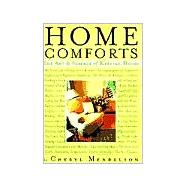Home Comforts is something new. For the first time in nearly a century, a sole author has written a comprehensive book about housekeeping. This is not a dry how-to manual, nor a collection of odd tips and hints, a cleaning book, a history book,

Note: Supplemental materials are not guaranteed with Rental or Used book purchases.
Purchase Benefits
What is included with this book?
Home Comforts is something new. For the first time in nearly a century, a sole author has written a comprehensive book about housekeeping. This is not a dry how-to manual, nor a collection of odd tips and hints, a cleaning book, a history book,
Contents
Preface
BEGINNINGS
1 My Secret Life
2 Easing into a Routine
3 Neatening
FOOD
4 The Whys and Wherefores of Home Cooking
5 Breakfast, Lunch, and Dinner
6 Serving Meals
7 Stimulating Beverages
8 The Center of a Dwelling
9 Kitchen Culture
10 To Market, to Market
11 Cold Comfort
12 Bread and Honey
13 Safe Food
CLOTH
14 The Fabric of Your Home
15 Transformations
16 The Natural Fibers
17 The Man-Made Fibers and Blends
18 Fabrics That Work
19 Carefully Disregarding Care Labels
20 Gathering, Storing, and Sorting Laundry
21 Laundering
22 Drying the Laundry
23 Ironing
24 Folding Clothes and Linens
25 How to Launder Tricky Items
26 Common Laundry Mishaps and Problems
27 Sanitizing the Laundry
28 Removing Stains from Fabrics
CLEANLINESS
29 The Air in Your Castle
30 Peaceful Coexistence with Microbes
31 The Chemistry of Household Cleaning
32 Aprons, Rags, and Mops
33 Dust and Dust Mites
34 Vacuuming, Sweeping, and Dusting
35 Textile Furnishings
36 Floors and Furniture of Wood and Woodlike Materials
37 Resilient Floors
38 Ceramic Tile
39 Stone
40 Man-Made Solid Surfaces and Other Plastics
41 Bathrooms
42 Pipes and Drains
43 Walls, Ceilings, Woodwork, and Windows
44 China and Crystal
45 Metals
46 Caring for Jewelry
DAILY LIFE
47 Kindly Light
48 Fireplaces
49 Some Quiet Occupations
50 Sewing
51 Caring for Books
52 Music
53 Images and Recordings
54 Home Offices and Computers
55 Pets
SLEEP
56 The Cave of Nakedness
57 Beds and Bedding
58 Closets for Clothes and Linens
SAFE SHELTER
59 Being Prepared
60 Fire
61 Electrical Safety
62 Slips and Falls
63 Further Miscellaneous Safety Rules
64 Poisons, Hazardous Substances, and Proper Disposal of Hazardous Household Wastes
65 Additional Safety Measures for Children
FORMALITIES
66 Understanding Your Castle
67 Too Late to Say You¹re Sorry
68 Promises, Promises
69 Domestic Employment Laws
70 Working with Household Help
71 Insurance
72 Fond Records
NOTES
ACKNOWLEDGMENTS AND
SOURCES
INDEX
PREFACE
The New copy of this book will include any supplemental materials advertised. Please check the title of the book to determine if it should include any access cards, study guides, lab manuals, CDs, etc.
The Used, Rental and eBook copies of this book are not guaranteed to include any supplemental materials. Typically, only the book itself is included. This is true even if the title states it includes any access cards, study guides, lab manuals, CDs, etc.